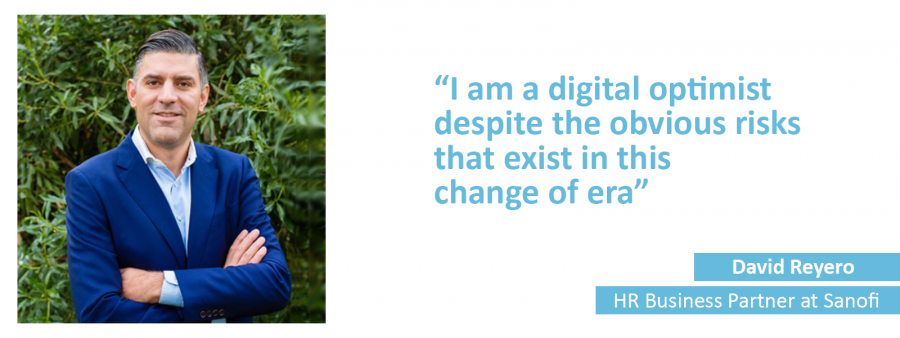Interview with David Reyero, HR Business Partner at Sanofi

In the next Corporate Meeting we will have the HR Business Partner at Sanofi, David Reyero. David is a lecturer, visiting professor at several business schools, and blogger. He defines himself as a digital optimist despite the obvious risks that exist in this change of era. Get to know him a little better in this interview.
Presentation
I am from Leon, 48 years old, married with three children, an economist with an MBA from the Instituto de Empresa. Today I work as an HR Business Partner at Sanofi, one of the world’s leading healthcare companies.
I have 25 years of professional experience in people management in consulting, internet banking, telecommunications and the last 17 years at Sanofi. My areas of expertise in addition to Human Resources are business transformation and development.
I am a lecturer, visiting professor at different business schools, and blogger because I believe in the responsibility of managers to improve society.
What is digital transformation for you?
A process of profound evolution at a personal, social, economic and organizational level with multiple impacts: new ways of relating, new business models, changes in management processes, new ways of managing external and internal clients (our teams) and new technologies that make our lives easier. I am a digital optimist despite the obvious risks that exist in this paradigm shift.
What is the current status of digital transformation in Spain?
I believe we are making progress, although we are not yet a leading country in the world. I believe there are talent and good concrete initiatives in multiple areas (administration, education, companies, or the third sector), but I miss some important aspects: more ambition in all kinds of resources, thinking bigger, more focus on digital education at any age to gain competitiveness.
Why do you believe today's professionals should be trained in digital transformation?
Acquiring both fundamental digital skills and understanding how this new world works is key. I would dare to say that they no longer provide a competitive advantage, but a basic tool to compete.
For example, and unfortunately, I believe that in a few years there may be “digital illiterates” with a significant impact on their employability and this today is avoidable.
Mistakes to avoid in digital transformation
I like to emphasize three big mistakes within my personal experience and the one that has been generated in the market.
1.Not understanding that the success of this process is mainly about people and cultural change, and not so much about technology and new business models.
2.Do not truly put the customer at the center (external and internal).
3.Not being able to manage time well, combining patience and tenacity with agility.
Pending challenges in managing digital transformation
I will focus on four that seem especially relevant to me:
1.We need to forget about “stage fright” to technology and to this transformation that is still perceived in some people.
2.Better manage data privacy and cybersecurity.
3.Strengthen the education and training system to increase learning agility in this continuous technological disruption that tends to accelerate.
4.Achieve a truly “hybrid” digital transformation, combining the best of technology (artificial intelligence) with humanism (human intelligence). Today I sometimes see a certain deficit of humanism.
What short-term and long-term challenges will companies need to address in terms of digital transformation?
There are very different levels of digital maturity according to companies. For some, the challenge will be to enter this world and see the benefits for their business, taking advantage of, among other factors, the “covid effect” in the acceleration of digitalization.
For more advanced companies, I believe that an important challenge will be to better manage “big data” and the necessary efficiency with “small data” and the growing need for personalization of customers and employees.
The eHealth sector is always ahead in budget and resources. How long has Sanofi been working on digital transformation and how has it developed?
This disruption generates opportunities throughout the value chain of the pharmaceutical sector, from research (digital clinical trials or use of big data in post-marketing trials), production (factory 4.0) or commercialization (omnichannel management of stakeholders or the comprehensive management of pathologies including digital tools and services).
At Sanofi, we think that what is different is people and their new ways of working, based on a solid process of awareness and communication (internal and external) and collective training and self-training.
It is the team that can lead the necessary transformation to success or failure, like any deep transformation process. That is why we launched Sanofi 4.0 a few years ago, a multi-departmental project, co-led by technology, digital marketing, communication, and human resources. The importance of the transversal involvement of the departments has been key to advance in the implementation and consolidation of the digital transformation.
Accompany, raise awareness, train, generate enthusiasm, promote self-responsibility and self-training, communicate with transparency, realism, be patient, celebrate small successes, engage all generations in this change, treat people with maturity… These are examples of the dynamics that we are creating to take advantage of the digital opportunity.
A complex process, with ups and downs and that requires time and focus, especially in the health sector. An industry where product efficacy and safety is still fundamental and where it is not always easy or obvious to visualize the value of digital and to deeply involve some actors in the ecosystem.